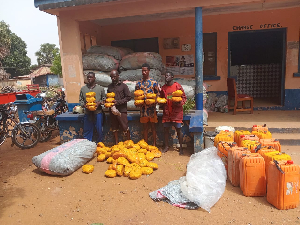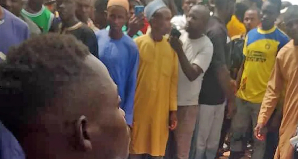Mr Dela Gadzanku, the Eastern and Volta Regional Chairman of the Association of Ghana Industries (AGI), has called for the promotion of the wearing of made in Ghana footwear alongside the wearing of made in Ghana clothes on Fridays.
He said the textile industry has received a boost as a result of the promotion of the wearing of Ghanaian fabrics on Fridays and proposed the extension of the same initiative to the footwear industry.
Mr Gadzanku was speaking to the media in an interview after a tour of some leather establishments by the National Chairperson of AGI in charge of textiles, garments and leather.
The tour team was made up of Mrs Doris Kessie, National Chairperson of AGI for Textiles, Garment and Leather; Mrs Sharon Boccoh, Chief Executive Officer(CEO) of Vashty Garments; Mr Yaw Barimah, CEO, Barimah Shoes; and officials of AGI of Eastern and Volta Regional Branch.
The two day tour, formed part of a familiarization and fact finding mission to engage with members of the Association in the Volta and Eastern regions.
Mr Gadzanku said to imbibe the idea in the younger generation, we could also introduce the policy in the educational sector by calling on students to wear locally manufactured footwear.
He appealed to the shoe manufacturers to reduce the prices of their shoes so that more Ghanaians can patronize the locally manufactured products.
Mr Gadzanku said his outfit is working with the textiles, garments and leather sector of AGI to launch an initiative to get Ghanaians to wear local footwear.
Mr Yaw Barimah Agyapong, the CEO of Barimah Shoes, said the promotion of locally manufactured footwear would create a lot of opportunities for the employment of many young people.
He commended government for initiating various Technical, Vocational Education Training (TVET) policies and called for a second look at the implementation of the policies to enable the country to derive the maximum benefit from them.
Mr Barimah said due to the lack of modern equipment, footwear manufacturers in the industry produce at a low capacity which contributes to the high cost of production.
He said the cost of raw materials coupled with the duties at the port is also affecting the cost of production and called on government to reduce some of the taxes to ensure that they can always produce and give customers good prices.
The team as part of the tour visited the Akuley Shoe factory in Kpando, Ho Technical University, TVET centre and some leather and garment establishments in Kpando, Hohoe and Ho as well as the Kente weaving center in Kpetoe.
Business News of Thursday, 15 August 2019
Source: ghananewsagency.org
Introduce Friday wear for locally made footwear - AGI Chairman
Entertainment












